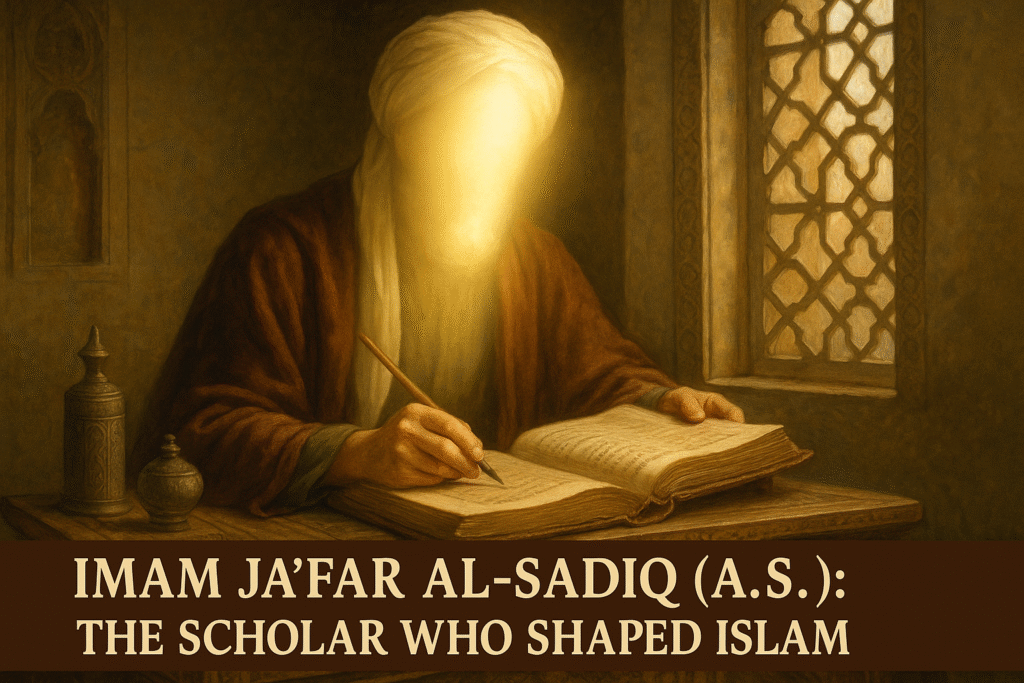Introduction
Throughout Islamic history, certain personalities have not only defined their eras but also laid intellectual and spiritual foundations that continue to guide generations. Imam Jafar al-Sadiq (A.S.), the sixth Imam in the line of Ahlul Bayt (A.S.), stands out as one of the most influential figures in both Shia and Sunni traditions. Revered for his vast knowledge, piety, and humility, Imam al-Sadiq shaped the contours of Islamic jurisprudence, theology, and ethics during a crucial transitional period.
This article explores the extraordinary legacy of Imam Jafar al-Sadiq (A.S.), whose teachings impacted not only Shia Islam but also the broader Islamic world. From science to law, theology to spirituality, his scholarly contributions remain vital even today.
Focus Keywords: Imam Jafar al-Sadiq, Shia scholar, Islamic jurisprudence, Ahlul Bayt teachings.
Table of Contents
- Historical Background
- Spiritual and Scholarly Contributions
- Influence on Islamic Schools of Thought
- Stories and Sayings of Imam Jafar al-Sadiq
- Legacy and Modern-Day Relevance
- Conclusion
Historical Background
Imam Jafar al-Sadiq (A.S.) was born in Medina in 702 CE (83 AH) and lived during the Umayyad and Abbasid caliphates—a time of political unrest but also intellectual awakening. He was the son of Imam Muhammad al-Baqir (A.S.) and a direct descendant of both Imam Ali (A.S.) and Abu Bakr from his mother’s side, giving him a unique position in Islamic history.
He became the sixth Imam after the martyrdom of his father and led the Shia community for over three decades. His era was marked by relative political relaxation, which allowed him to establish a major center of Islamic learning in Medina. Thousands of students—including later founders of Sunni schools—benefited from his unmatched knowledge.
Spiritual and Scholarly Contributions
Imam Jafar al-Sadiq (A.S.) was a giant in every field of knowledge—religious sciences, natural philosophy, theology, jurisprudence, and ethics.
Theology and Fiqh
He systematized many of the doctrines of Shia theology and jurisprudence, which came to be known as Ja’fari Fiqh. His teachings emphasized:
- Tawheed (Oneness of God) with deep metaphysical insights
- Justice (‘Adl) as a core principle of faith
- Imamate as both a spiritual and rational necessity
His legal rulings were derived not only from Quran and Hadith, but also reason (‘aql), laying the foundation for ijtihad (independent reasoning).
Science and Natural Philosophy
Imam al-Sadiq encouraged empirical observation and reflection on nature. He discussed topics such as:
- Astronomy: Orbits of planets and the shape of the earth
- Chemistry: Prefiguring some alchemical principles later developed by Jabir ibn Hayyan
- Medicine: Understanding the temperament of the body and disease prevention
Jabir ibn Hayyan, often called the father of chemistry, was one of his most famous students.
Influence on Islamic Schools of Thought
Imam Jafar al-Sadiq’s influence extended beyond Shia Islam. Many prominent Sunni scholars studied under him, including:
- Abu Hanifa: Founder of the Hanafi school, who reportedly said: “I have not seen anyone more knowledgeable than Ja’far ibn Muhammad.”
- Malik ibn Anas: Founder of the Maliki school, who also had scholarly exchanges with the Imam.
His school of thought became known as the Ja’fari Madhhab, officially recognized in many global Islamic institutions today. This school emphasizes reason, moral responsibility, and the guidance of the Imams.
Stories and Sayings of Imam Jafar al-Sadiq
Story of Humility
One day, a man insulted Imam al-Sadiq in public. The Imam, instead of reacting angrily, invited the man to his home, served him food, and spoke kindly. The man left ashamed and eventually became one of his followers.
On Knowledge
“Knowledge is a light which God casts into the heart of whomever He wills.”
On Justice
“A believer is not a believer until he desires for his brother what he desires for himself.”
These stories and sayings reflect his spiritual depth, ethical clarity, and human compassion.
Legacy and Modern-Day Relevance
Imam Jafar al-Sadiq’s contributions are more relevant than ever:
- In education: He exemplifies the harmony of reason and faith
- In ethics: He offers a model of principled resistance and inner piety
- In jurisprudence: He laid down a dynamic, adaptable framework of Islamic law
Shia communities across the world—from Iran to Iraq, Lebanon to India—consider him a foundational figure in preserving and transmitting the teachings of the Prophet (PBUH).
His shrine in Jannat al-Baqi, though destroyed in 1925, remains a powerful symbol of his enduring legacy.
Conclusion
Imam Jafar al-Sadiq (A.S.) was not only a descendant of the Prophet (PBUH) but a true inheritor of his knowledge and mission. Through his scholarship, spiritual insight, and unwavering devotion to truth, he shaped the path of Islam for future generations.
His legacy lives on in every school of Shia thought, in the legal principles of Sunni jurisprudence, and in the hearts of millions who seek both knowledge and God.
Also read:

